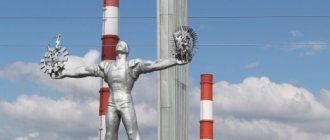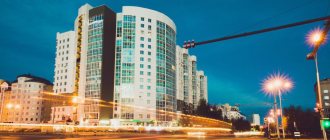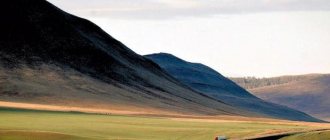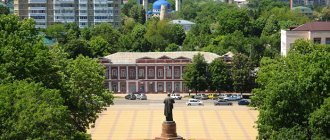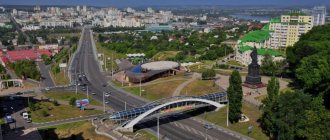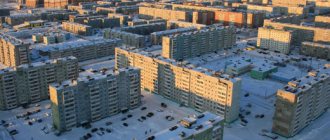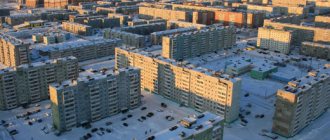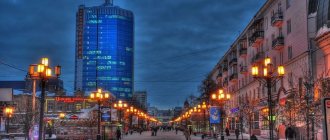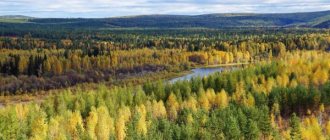This term has other meanings, see Bilibino (meanings).
| City Bilibino
|
| A country | Russia, Russia |
| Subject of the federation | Chukotka Autonomous OkrugChukotka Autonomous Okrug |
| Municipal district | Bilibinsky |
| urban settlement | Bilibino |
| Coordinates | 68°03′00″ n. w. 166°27′00″ E. d. / 68.05000° n. w. 166.45000° E. d. / 68.05000; 166.45000 (G) [www.openstreetmap.org/?mlat=68.05000&mlon=166.45000&zoom=12 (O)] (Z)Coordinates: 68°03′00″ N. w. 166°27′00″ E. d. / 68.05000° n. w. 166.45000° E. d. / 68.05000; 166.45000 (G) [www.openstreetmap.org/?mlat=68.05000&mlon=166.45000&zoom=12 (O)] (I) |
| Head of a city settlement | Kozhevnikova Olga Sergeevna |
| Based | in 1955 |
| Former names | until 1956 - Karalvaam |
| City with | 1993 |
| Square | 22.15 km² |
| Center height | 270 |
| Population | ↘5453[1] people (2016) |
| Density | 246.19 people/km² |
| Agglomeration | 5 814 |
| Names of residents | Bilibinets, Bilibintsy[2] |
| Timezone | UTC+12 |
| Telephone code | +7 42738 |
| Postcode | 689450 |
| Vehicle code | 87 |
| OKATO code | [classif.spb.ru/classificators/view/okt.php?st=A&kr=1&kod=77209501 77 209 501] |
| Official site | [bilchao.ru/ .ru] |
| Bilibino Moscow |
| : Incorrect or missing image Anadyr Bilibino |
Audio, photo and video
on Wikimedia Commons
K: Settlements founded in 1955
Bilibino
- a city (since 1993) in Russia, the administrative center of the Bilibinsky district of the Chukotka Autonomous Okrug.
Story
In 1955, in the valley of the Karalvaam River, geologists discovered the first placer gold in industrial concentration. The construction of the gold mining base Karalvaam (from Chukotka “ karal”
" - pen for deer, "
vaam "/" veem
" - river).
Since the bulk of geologists arrived from Seymchan, the first street of the village under construction was named Seymchanskaya
.
On February 10, 1956, by decision of the executive committee of the East Tundra region, the town of Karalvaam was renamed Bilibino, in honor of the discoverer of the “Golden Kolyma” - geologist Yuri Bilibin.
On August 2, 1961, the center of the Eastern Tundra region was moved from the village of Anyuisk to the village of Bilibino, and the Eastern Tundra district was renamed Bilibino.
Bilibino received city status on June 28, 1993[3].
In 2010, Bilibino became the center of the newly created municipal formation Urban Settlement Bilibino
, which included the rural settlement of Keperveem[4].
What do the locals eat?
We eat purchased products and what we can get from our own farm. Prices in the city are very high. Apples cost about 400 rubles, eggs 180 rubles, bananas and lemons from 400 rubles. up to 700 rub., beef 300 rub.
Moreover, fruits and vegetables are much more expensive than meat. Because there is no way to grow the latter in permafrost conditions, and local residents raise cows, and the meat of deer, seal and fish are cheaper here, because for the people living here this is not at all exotic.
Economy
Industry
In the past, one of the largest gold mining enterprises in the USSR, the Bilibino Mining and Processing Plant, was based in the city, as well as the Anyui Geological Exploration Expedition
.
Nowadays the enterprises do not work, are abandoned and looted. Alluvial gold mining in the Bilibino region is carried out by small artisanal teams. A large primary gold deposit (Karalveem mine) is being developed 20 km from Bilibino. Energy
The Bilibino Nuclear Power Plant with a total electrical capacity of 48 MW is located near the city, providing the city with electrical and thermal energy. The first unit with the EGP-6 reactor plant was brought into operation on January 12, 1974. Bilibino NPP is the only nuclear power plant in the permafrost zone. It is a branch of Rosenergoatom Concern.
In 2011, a decision was made to begin decommissioning the station starting in 2021. A Basic Fuel Depot is being built in the village, which is necessary to supply the projected Diesel Power Plant, which, in turn, is necessary to begin decommissioning the nuclear power plant (the planned start date for construction is 2015). A separate energy complex is being designed to supply the city with electricity and heat.
Agriculture
There is a greenhouse facility - the municipal unitary enterprise "Rosinka Vegetable Factory". The area of the greenhouse complexes is 0.75 hectares. In 2014, the enterprise grew 69.1 tons of vegetable products[21]. The number of personnel is 22 people[22]. The factory produces and sells up to 30 types of canned vegetables. Part of the greenhouse area is dedicated to growing flowers.
There is a meat and dairy food plant in Bilibino.
What can you visit?
You can get to the Nuclear Power Plant on a guided tour if you sign up for it in advance. Those who want to inspect what is inside must wear special slippers, and when entering the room with a nuclear reactor, take off their shoes altogether. Everything looks pretty clean and tidy inside. Everything works and is in its place.
It is noteworthy that icons can be seen on some devices. Of course, it is desirable that God protect the city of Bilibino (Chukotka) from dangerous incidents, and especially from the explosion of a power plant.
Education and social infrastructure
- Secondary school (two buildings), two kindergartens (Alyonushka and Skazka), a children's art school, a children's and youth sports school, a children's creativity center, a cultural center.
- Branch of the state educational institution of secondary vocational education "St. Petersburg Industrial and Economic College", educational and production complex PTU-1.
- Central regional hospital with 105 beds.
- Hotel "Severyanka", communication center, wide network of shops, library, local history museum, swimming pool (opened in 2013), bathhouse, gym. There are tailoring and clothing repair shops, photo salons, a cafe, and a restaurant.
According to the General Plan in Bilibino, it is planned to reconstruct the building of the former Iskra cinema into a sports hall, build an indoor sports complex, as well as a regional sanatorium treatment center[23].
Attractions
Bilibino Local Lore Museum named after. G.S. Glazyrina is the most significant landmark of the town. It was created as a public institution in 1972. The initiator of its opening was geologist Grigory Sergeevich Glazyrin, whose name is now given to the museum.
The exhibition is distinguished by the number of exhibits in the paleontological department, where the fauna of the Ice Age is presented. One of the main exhibits is a life-size replica of a baby mammoth. Among other departments, the ethnographic exhibition, sections on the natural resources of the region, and the history of its development are of great interest to visitors.
The city monument to participants in the Great Patriotic War of 1941-1945 has an unusual history. In the 1990s. a huge boulder weighing several tons with a hole in the middle was brought by geologists to the city center as a protest against the closure of the mines.
After the conflict was overcome, the stone remained on the street. In 2015, in the year of the 70th anniversary of the victory, the vylun was turned into a monument to the dead. An inscription appeared on its surface in memory of the fallen heroes, and the through hole was covered with a red star.
Another monument was erected on the street in honor of the founder of the city, geologist Yu.A. Bilibin, who was at the forefront of the development of gold mines in the region. It was opened in January 2004 in the city square.
The base for the bronze bust was a boulder weighing about 20 tons. A curious attraction of Bilibino is the observation deck on the Orbita hill. From the height of its slope you can see the entire town surrounded by mountain spurs.
Transport
Bilibino is connected to the region’s villages, mines and the city of Pevek by numerous dirt roads and winter roads. A wide pebble and dirt road was built connecting the regional center with the seaport on the Kolyma River - Cape Verde, from where the main supply of the city with everything necessary is carried out.
Air communication with the city is carried out through the Keperveem airport, located in the village of the same name, where a 36-kilometer year-round IV category highway with a hard (dirt) surface is laid.
Housing
The only Severyanka hotel in the city is located 800 m from the center on Oktyabrskaya Street. At the same time, it can accommodate 48 guests in 24 rooms of standard business and luxury classes. You can also book a bed in a dormitory room. The cost of a private room starts from 2,400 rubles/day.
Hotel rooms are equipped with comfortable furniture, refrigerator, TV, microwave, and other household and kitchen appliances. Internet access via wi-fi is provided. Meals are not provided at the hotel.
Hotel Severyanka
An alternative option for temporary residence in Bilibino can be renting an apartment. The average cost of the service according to the website “Your Address” in April 2021 is 6,191 rubles. per month. The cost of renting a one-room apartment starts from 5,000 rubles/month, a two-room apartment starts from 6 thousand rubles/month and more.
It is possible to rent an apartment daily at a price of 1,500 rubles. in a day. The main housing stock of the city consists of mid-rise houses built on stilts. Large-panel or block buildings of 4-5 floors are attractive with brightly painted facades.
Climate
| Climate Bilibino | |||||||||||||
| Index | Jan. | Feb. | March | Apr. | May | June | July | Aug. | Sep. | Oct. | Nov. | Dec. | |
| Absolute maximum | 0 | 3 | 1,8 | 8,3 | 23,2 | 32 | 35,1 | 29,9 | 21 | 8 | 3,2 | 1,9 | |
| Average maximum, °C | −27,6 | −26,8 | −17,5 | −6,8 | 5,9 | 16 | 16,8 | 13,9 | 5,6 | −8 | −22,3 | −27,5 | |
| Average minimum, °C | −32,2 | −32,7 | −28,7 | −18,5 | −3,2 | 5,2 | 6,7 | 3,4 | −1,8 | −14,4 | −27,3 | −32,4 | |
| Absolute minimum, °C | −58 | −54 | −50,3 | −39,7 | −23,5 | −5,4 | −2,3 | −8,2 | −15 | −37 | −47 | −52 | |
| Source: [www.meoweather.com/history/Russian%20Federation/na/68.05/166.3333333/Bilibino.html meoweather] | |||||||||||||
| Jan | Feb | Mar | Apr | May | Jun | Jul | Aug | Sep | Oct | But I | Dec | |
| Average year number of days with snowfall | 25 | 19 | 14 | 10 | 7 | 1 | 0 | 0 | 9 | 20 | 18 | 21 |
| Average year number of days with fogs | 0 | 0 | 0 | 0 | 0 | 0 | 1 | 2 | 1 | 0 | 0 | 0 |
Tourism
The tourism business sector in Bilibino is in its infancy. The city does not have a sufficient number of hotels or the accompanying entertainment industry. At the same time, the city and its surroundings do not go unnoticed by travel companies from other regions of Chukotka and the country.
Bilibino on the map of Russia serves as the starting point of sports and extreme tourism routes. Just 70 km from Keperveem there is a unique geological anomaly - the Anyui stratovolcano. For the world of science, its discovery occurred quite recently, in 1956.
The crater of the volcano is located on the slope of Mount Vulkannaya at an altitude of m. An unusual feature of the natural attraction is a frozen “lava tongue”, the length of which, according to various sources, ranges from 40 to 56 km.
Rafting down the Omolon, Bolshoi and Maly Anyui rivers can be an exciting adventure for prepared tourists. Traveling by water through almost uninhabited places is a unique opportunity to better understand the pristine nature of the region.
Rafting on the Omolon River
There are several archaeological monuments on the territory of the Bilibinsky district. In the upper reaches of the Maly Anyui River on the shores of Lake Tytyl, places of worship and sites of ancient hunters were discovered. The age of the finds made there is estimated at 10 thousand years. Neolithic sites have also been found at Cape Sinitsyn, Lake Sredny and a number of other places.
The abolition of the closed border zone regime throughout almost all of Chukotka in 2021 has opened new horizons for the development of tourism in the Bilibino region. The city and region are attractive for lovers of extreme and ecological tourism, with water and land routes through hard-to-reach and sparsely populated places.
Educational ethnic tourism is considered a potentially promising direction. Serious obstacles to turning Bilibino into a new tourist center on the map of Russia remain the high cost of tours in Chukotka, the difficult economic situation, distance from transport hubs and insufficient development of the necessary infrastructure.
An excerpt characterizing Bilibino
- Who do you want, sir? - said a voice from the darkness. Petya answered that the boy was French, who was taken today. - A! Spring? - said the Cossack. His name Vincent has already been changed: the Cossacks - into Vesenny, and the men and soldiers - into Visenya. In both adaptations, this reminder of spring coincided with the idea of a young boy. “He was warming himself by the fire there.” Hey Visenya! Visenya! Spring! – voices and laughter were heard in the darkness. “And the boy is smart,” said the hussar standing next to Petya. “We fed him just now.” Passion was hungry! Footsteps were heard in the darkness and, bare feet splashing in the mud, the drummer approached the door. – Ah, c'est vous! - said Petya. – Voulez vous manger? “N’ayez pas peur, on ne vous fera pas de mal,” he added, timidly and affectionately touching his hand. - Entrez, entrez. [Oh, it's you! Are you hungry? Don't be afraid, they won't do anything to you. Come in, come in.] - Merci, monsieur, [Thank you, sir.] - answered the drummer in a trembling, almost childish voice and began to wipe his dirty feet on the threshold. Petya wanted to say a lot to the drummer, but he didn’t dare. He stood next to him in the hallway, shifting. Then in the darkness I took his hand and shook it. “Entrez, entrez,” he repeated only in a gentle whisper. “Oh, what should I do to him!” - Petya said to himself and, opening the door, let the boy pass by. When the drummer entered the hut, Petya sat away from him, considering it humiliating for himself to pay attention to him. He just felt the money in his pocket and was in doubt whether it would be a shame to give it to the drummer. From the drummer, who, on Denisov’s orders, was given vodka, mutton and whom Denisov ordered to dress in a Russian caftan, so that, without sending him away with the prisoners, he would be left with the party, Petya’s attention was diverted by the arrival of Dolokhov. Petya in the army heard many stories about the extraordinary courage and cruelty of Dolokhov with the French, and therefore, from the moment Dolokhov entered the hut, Petya, without taking his eyes off, looked at him and became more and more encouraged, twitching his head raised, so as not to be unworthy even of such a society as Dolokhov. Dolokhov’s appearance strangely struck Petya with its simplicity. Denisov dressed in a checkmen, wore a beard and on his chest the image of St. Nicholas the Wonderworker, and in his manner of speaking, in all his manners, he showed the peculiarity of his position. Dolokhov, on the contrary, previously, in Moscow, who wore a Persian suit, now had the appearance of the most prim Guards officer. His face was clean-shaven, he was dressed in a guards cotton frock coat with George in the buttonhole and a simple cap straight on. He took off his wet cloak in the corner and, going up to Denisov, without greeting anyone, immediately began asking about the matter. Denisov told him about the plans that large detachments had for their transport, and about sending Petya, and about how he responded to both generals. Then Denisov told everything he knew about the position of the French detachment. “That’s true, but you need to know what and how many troops,” said Dolokhov, “you will need to go.” Without knowing exactly how many there are, you cannot start the business. I like to do things carefully. Now, would any of the gentlemen want to go with me to their camp? I have my uniforms with me. - I, I... I will go with you! – Petya screamed. “You don’t need to go at all,” Denisov said, turning to Dolokhov, “and I won’t let him in for anything.” - That's great! - Petya cried out, - why shouldn’t I go?.. - Yes, because there is no need. “Well, excuse me, because... because... I’ll go, that’s all.” Will you take me? – he turned to Dolokhov. “Why…” answered Dolokhov absentmindedly, peering into the face of the French drummer. - How long have you had this young man? – he asked Denisov. - Today they took him, but he doesn’t know anything. I left it for myself. - Well, where are you putting the rest? - said Dolokhov. - How to where? I'm sending you under the guard! – Denisov suddenly blushed and cried out. “And I can boldly say that there is not a single person on my conscience.” Is it really right for you to send away a person under escort in a city, what to do, I will tell you, the honor of a soldier. “It’s decent for a young count of sixteen to say these pleasantries,” Dolokhov said with a cold grin, “but it’s time for you to leave it.” “Well, I’m not saying anything, I’m just saying that I will definitely go with you,” Petya said timidly. “And it’s time for you and me, brother, to give up these pleasantries,” Dolokhov continued, as if he found special pleasure in talking about this subject that irritated Denisov. - Well, why did you take this to you? - he said, shaking his head. - Then why do you feel sorry for him? After all, we know these receipts of yours. You send them a hundred people, and thirty will come. They will starve or be beaten. So is it all the same not to take them? Esaul, narrowing his bright eyes, nodded his head approvingly. - This is all shit, there’s nothing to discuss here. I don’t want to take it on my soul. You talk - pomg'ut. Well, hog'osho. Just not from me. Dolokhov laughed. “Who didn’t tell them to catch me twenty times?” But they will catch me and you, with your chivalry, anyway. – He paused. - However, we have to do something. Send my Cossack with a pack! I have two French uniforms. Well, are you coming with me? – he asked Petya. - I? Yes, yes, absolutely,” Petya cried, blushing almost to tears, looking at Denisov. Again, while Dolokhov was arguing with Denisov about what should be done with the prisoners, Petya felt awkward and hasty; but again I did not have time to fully understand what they were talking about. “If big, famous people think so, then it must be so, therefore it’s good,” he thought. “And most importantly, Denisov must not dare to think that I will obey him, that he can command me.” I will definitely go with Dolokhov to the French camp. He can do it and so can I.” To all of Denisov’s urgings not to travel, Petya replied that he, too, was used to doing everything carefully, and not Lazar’s at random, and that he never thought about danger to himself. “Because,” you yourself must agree, “if you don’t know correctly how many there are, the lives of maybe hundreds depend on it, but here we are alone, and then I really want this, and I will definitely, definitely go, you won’t stop me.” “, he said, “it will only get worse... Dressed in French greatcoats and shakos, Petya and Dolokhov drove to the clearing from which Denisov looked at the camp, and, leaving the forest in complete darkness, descended into the ravine. Having driven down, Dolokhov ordered the Cossacks accompanying him to wait here and rode at a fast trot along the road to the bridge. Petya, transfixed with excitement, rode next to him. “If we get caught, I won’t give up alive, I have a gun,” Petya whispered. “Don’t speak Russian,” Dolokhov said in a quick whisper, and at that same moment a cry was heard in the darkness: “Qui vive?” [Who's coming?] and the ringing of a gun. Blood rushed to Petya's face, and he grabbed the pistol. “Lanciers du sixieme, [Lancers of the sixth regiment.],” said Dolokhov, without shortening or increasing the horse’s stride. The black figure of a sentry stood on the bridge. – Mot d'ordre? [Feedback?] – Dolokhov held his horse and rode at a walk. – Dites donc, le colonel Gerard est ici? [Tell me, is Colonel Gerard here?] - he said. – Mot d'ordre! - Without answering, the sentry said, blocking the road. “Quand un officier fait sa ronde, les sentinelles ne demandent pas le mot d'ordre...” Dolokhov shouted, suddenly flushing, running his horse into the sentry. – Je vous demande si le colonel est ici? [When the officer goes around the chain, the sentries do not ask for feedback... I ask, is the colonel here?] And, without waiting for an answer from the guard who stood aside, Dolokhov walked up the hill at a walk. Noticing the black shadow of a man crossing the road, Dolokhov stopped this man and asked where the commander and officers were? This man, a soldier with a sack on his shoulder, stopped, came close to Dolokhov’s horse, touching it with his hand, and simply and friendlyly said that the commander and officers were higher on the mountain, on the right side, in the farm yard (that’s what he called the master’s estate). Having driven along the road, on both sides of which French conversation could be heard from the fires, Dolokhov turned into the courtyard of the manor’s house. Having passed through the gate, he dismounted from his horse and approached a large blazing fire, around which several people were sitting, talking loudly. Something was boiling in a pot on the edge, and a soldier in a cap and blue overcoat, kneeling, brightly illuminated by the fire, stirred it with a ramrod. “Oh, c'est un dur a cuire, [You can’t deal with this devil.]” said one of the officers sitting in the shadows on the opposite side of the fire. “Il les fera marcher les lapins... [He will get through them...],” said another with a laugh. Both fell silent, peering into the darkness at the sound of the steps of Dolokhov and Petya, approaching the fire with their horses. - Bonjour, messieurs! [Hello, gentlemen!] - Dolokhov said loudly and clearly. The officers stirred in the shadow of the fire, and one, a tall officer with a long neck, walked around the fire and approached Dolokhov. – C'est vous, Clement? - he said. – D'ou, diable... [Is that you, Clément? Where the hell...] - but he didn’t finish, having learned his mistake, and, frowning slightly, as if he were a stranger, he greeted Dolokhov, asking him how he could serve. Dolokhov said that he and a friend were catching up with their regiment, and asked, turning to everyone in general, if the officers knew anything about the sixth regiment. Nobody knew anything; and it seemed to Petya that the officers began to examine him and Dolokhov with hostility and suspicion. Everyone was silent for a few seconds. “Si vous comptez sur la soupe du soir, vous venez trop tard, [If you are counting on dinner, then you are late.],” said a voice from behind the fire with a restrained laugh. Dolokhov replied that they were full and that they needed to move on at night. He gave the horses to the soldier who was stirring the pot, and squatted down by the fire next to the long-necked officer. This officer, without taking his eyes off, looked at Dolokhov and asked him again: what regiment was he in? Dolokhov did not answer, as if he had not heard the question, and, lighting a short French pipe, which he took out of his pocket, asked the officers how safe the road was from the Cossacks ahead of them. “Les brigands sont partout, [These robbers are everywhere.],” answered the officer from behind the fire. Dolokhov said that the Cossacks were terrible only for such backward people as he and his comrade, but that the Cossacks probably did not dare to attack large detachments, he added questioningly. Nobody answered. “Well, now he’ll leave,” Petya thought every minute, standing in front of the fire and listening to his conversation. But Dolokhov again began the conversation that had stopped and directly began asking how many people they had in the battalion, how many battalions, how many prisoners. Asking about the Russian prisoners who were with their detachment, Dolokhov said: “La vilaine affaire de trainer ces cadavres apres soi.” Vaudrait mieux fusiller cette canaille, [It’s a bad thing to drag these corpses around with you. It would be better to shoot this bastard.] - and laughed loudly with such a strange laugh that Petya thought the French would now recognize the deception, and he involuntarily took a step away from the fire. No one responded to Dolokhov’s words and laughter, and the French officer, who was not visible (he was lying wrapped in an overcoat), stood up and whispered something to his comrade. Dolokhov stood up and called to the soldier with the horses.
Public services
For tourists visiting the city, catering remains a challenge. The only restaurant, Bilibinsky, is open on weekdays from 1300 to 1500. According to the menu, a three-course set lunch per person costs from 550 rubles. On Saturdays, the restaurant's Sladkoezhka cafe opens.
A few alternative catering options include Uncle Fyodor's cafe and Chill out. In the first of them, you can have a full meal only by reservation. The more cozy Chill out cafe does not have its own kitchen and can only offer tea or coffee with pastries and sweets.
You can rent sports equipment for active recreation and travel around the city from the staff of the city sports and fitness complex. Under its roof there is also a five-lane swimming pool and a sauna. Bilibino has created conditions for snowboarding, skiing, hockey and other team sports.
